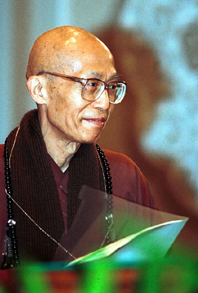The Founder

Master Sheng Yen
Master Sheng Yen was born in 1930 in a humble village in Jiang-su province. He grew up in impoverished conditions and also endured the flooding of the Yang-tze River and the disasters of war. In 1943, at the age of 13, Master Sheng Yen became a monk at Lang-shan Temple in Nang-tong County. In 1949, China was enmeshed in political conflict, and he had to disrobe and become a soldier. Consequently, he followed the government's army and moved to Taiwan in 1959. In 1960, he became a monk again under Master Dong-chu, which led to him spending six years in retreat at Mei-nung in southern Taiwan. At that time, Master Sheng Yen felt that academic research would help elevate the whole image of Buddhism, so in 1969, he went to Japan to study at Rissho University. Despite lacking funds, Master Sheng Yen persevered and received his Ph.D. in 1975. Upon returning to Taiwan, he taught at Chinese Culture University and Su-cho University and also acted as the director of the Institute of Buddhist Studies of China Academy. In addition, Master Sheng Yen founded the Chung-Hwa Institute of Buddhist Studies, and gave classes on the doctrines of the schools of Chan, Tien-Tai, Hsien Shou, Mind Only, Madhyamaka, and Precept.
Master Sheng Yen is not only highly regarded as Buddhist scholar, but also for his level of practice and practical way of teaching the Dharma. He has received transmissions from both the Lin-chi and Tsao-tung branches of the Chan School. In the past decades, he has traveled to Eastern and Western countries to teach the doctrines of Chan and has become a world-renowned Chan master.
In 1989, he founded Dharma Drum Mountain to fulfill his goal to "uplift the character of humankind and build a pure land on earth." He also promoted the three major sectors of Buddhist education and four major 21st century environmental protection programs, which have become known as the The Fivefold Mental Renaissance Campaign. These programs are held in high esteem by local social and political groups. In 1998, he held a philosophical dialogue with the Dalai Lama, the leader of one of the four main sects of Tibetan Buddhism, in New York. In 2000, as a leader of Chinese Buddhism, he participated in the Millennium World Peace Summit of Religious and Spiritual Leaders sponsored by the United Nations, and delivered the keynote speech at the opening ceremony. Master Sheng Yen has been revered by the media at home and abroad and has become a spokesman for all Chinese Buddhists throughout the world.
Educational Philosophy
Although the Master did not receive formal schooling, with resolute determination and perseverance, based on his vow to uplift the standard of Buddhist education, he earned a master and doctoral degree from Rissho University in just six years. His hard-earned achievements have won unanimous praise and admiration from scholars and Buddhists at home and abroad. The hardships and difficulties that he experienced made Master Sheng Yen even more determined to establish a high level and stable Buddhist education system, and launch more training programs. "My wish is to preserve the wisdom of Chinese Buddhism to the best of my ability," he said, "and, by introducing modern academic standards, research modes, educational systems, and teaching methods that are used overseas, I hope that Buddhist studies in Taiwan will achieve the same standards as mainstream research abroad."
With this vow, Master Sheng Yen established the Dharma Drum Mountain Chung-Hwa Institute of Buddhist Studies, which has now grown at a steady and methodical pace to a graded educational system. Therefore, he has actively enhanced Chinese culture, promoted international Buddhist scholarly research, and fostered a high standard of Buddhist education and also harnessed human resources to benefit society.
Graduates of the Buddhist Studies programs have gone on to take up teaching jobs at universities and Buddhist colleges; and those who are engaged in propagating Buddhism have become responsible for literary publications, given public speeches, and are involved in administrative or managerial work. Thus the Institute has adopted a progressive attitude in regards to its educational policies and curricular design. It trains students to think and do research independently based on basic disciplines such as linguistics, methodology, and logic, with an emphasis being placed on speaking, reporting, teaching, management and leadership etc.
In order to develop Buddhism in the long term, Master Sheng Yen advocates a multi-faceted nurturing of human resources and hopes that throughout their studies, the research students can bear the goals of the Institute in mind:
- Our roots are Chinese, our branches are global.
- Our specialty is Buddhist studies, and our aim to uphold orthodox Buddhism.
- We combine understanding with practice, and join compassion with wisdom.
- Practicality is our priority and benefiting others is our emphasis.
Further information about Master Sheng Yen, please refer to: http://www.shengyen.org